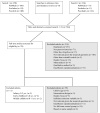The Role of Family Function and Triadic Interaction on Preterm Child Development-A Systematic Review
- PMID: 36360423
- PMCID: PMC9689109
- DOI: 10.3390/children9111695
The Role of Family Function and Triadic Interaction on Preterm Child Development-A Systematic Review
Abstract
Preterm infants are at high risk of developmental disability/delay and are more dependent on their caregiving environment for regulation due to their neurological immaturity. A premature birth is also a major stressor to the family system that constitutes the infant's caregiving environment. The following systematic review investigates whether families with preterm children differ from families with full-term children in their interactions, and what impact the quality of family interaction has on child development. Using the Cochrane model, we conducted a systematic review of quantitative studies published in psycINFO, socINDEX, and PubMed, concerning family quality in triadic interactions in families with premature infants and children, and at least one child development outcome variable. The quality of these studies was assessed using the Newcastle-Ottawa scale assessment form for cohort studies (NOS). Eleven studies were included in the review. Quality of family interactions is either equal to or poorer in families with preterm children, compared with families with full-term children. Importantly, the link between quality of family interactions and child development outcome is stronger in preterm children compared with full-term children, regarding both positive and negative influence. Our results highlight the importance of strengthening family interactions in order to promote development in preterm children. Notably, this review provides the first systematic overview of family function and the quality of triadic interactions in preterm families. The limited number of studies with a family-system focus makes it difficult for us to draw any definitive conclusions, while underscoring the need for more observational studies, particularly post-infancy, to be able to identify specific aspects of family interactions that may be critical for preterm child development.
Keywords: child development; family alliance; family functioning; family interaction; preterm; triadic interaction.
Conflict of interest statement
The authors declare no conflict of interest. The funding source had no involvement in the study design, collection, analysis and interpretation of data, writing of the report, or the decision to submit the article for publication.
Similar articles
-
Parental representations after preterm birth: a narrative review.Front Psychol. 2023 Sep 4;14:1114418. doi: 10.3389/fpsyg.2023.1114418. eCollection 2023. Front Psychol. 2023. PMID: 37731868 Free PMC article. Review.
-
Parents' experiences of transition when their infants are discharged from the Neonatal Intensive Care Unit: a systematic review protocol.JBI Database System Rev Implement Rep. 2015 Oct;13(10):123-32. doi: 10.11124/jbisrir-2015-2287. JBI Database System Rev Implement Rep. 2015. PMID: 26571288
-
Early dyadic patterns of mother-infant interactions and outcomes of prematurity at 18 months.Pediatrics. 2006 Jul;118(1):e107-14. doi: 10.1542/peds.2005-1145. Pediatrics. 2006. PMID: 16818525
-
The future of Cochrane Neonatal.Early Hum Dev. 2020 Nov;150:105191. doi: 10.1016/j.earlhumdev.2020.105191. Epub 2020 Sep 12. Early Hum Dev. 2020. PMID: 33036834
-
Neonatal interventions for preventing cerebral palsy: an overview of Cochrane Systematic Reviews.Cochrane Database Syst Rev. 2018 Jun 20;6(6):CD012409. doi: 10.1002/14651858.CD012409.pub2. Cochrane Database Syst Rev. 2018. PMID: 29926474 Free PMC article.
Cited by
-
Joint parental stimulation and early childhood development in 26 sub-Saharan African countries.BMJ Paediatr Open. 2025 Apr 17;9(1):e003091. doi: 10.1136/bmjpo-2024-003091. BMJ Paediatr Open. 2025. PMID: 40250853 Free PMC article.
-
Effect of Model of Neonatal Care on Neurodevelopment at the 18 Month Follow-Up in Moderate and Late Preterm Infants.J Clin Med. 2025 Jan 17;14(2):586. doi: 10.3390/jcm14020586. J Clin Med. 2025. PMID: 39860593 Free PMC article.
-
Parental representations after preterm birth: a narrative review.Front Psychol. 2023 Sep 4;14:1114418. doi: 10.3389/fpsyg.2023.1114418. eCollection 2023. Front Psychol. 2023. PMID: 37731868 Free PMC article. Review.
-
A systematic review and meta-analysis of parental mentalization in fathers and mothers.Infant Ment Health J. 2025 Jul;46(4):406-423. doi: 10.1002/imhj.70001. Epub 2025 Feb 3. Infant Ment Health J. 2025. PMID: 39901332 Free PMC article.
References
-
- Robinson R., Lahti-Pulkkinen M., Schnitzlein D., Voit F., Girchenko P., Wolke D., Lemola S., Kajantie E., Heinonen K., Räikkönen K. Mental health outcomes of adults born very preterm or with very low birth weight: A systematic review. Semin. Fetal Neonatal Med. 2020;25:101113. doi: 10.1016/j.siny.2020.101113. - DOI - PubMed
-
- Shah P.E., Robbins N., Coelho R.B., Poehlmann J. The paradox of prematurity: The behavioral vulnerability of late preterm infants and the cognitive susceptibility of very preterm infants at 36 months post-term. Infant Behav. Dev. 2013;36:50–62. doi: 10.1016/j.infbeh.2012.11.003. - DOI - PMC - PubMed
Publication types
Grants and funding
LinkOut - more resources
Full Text Sources


